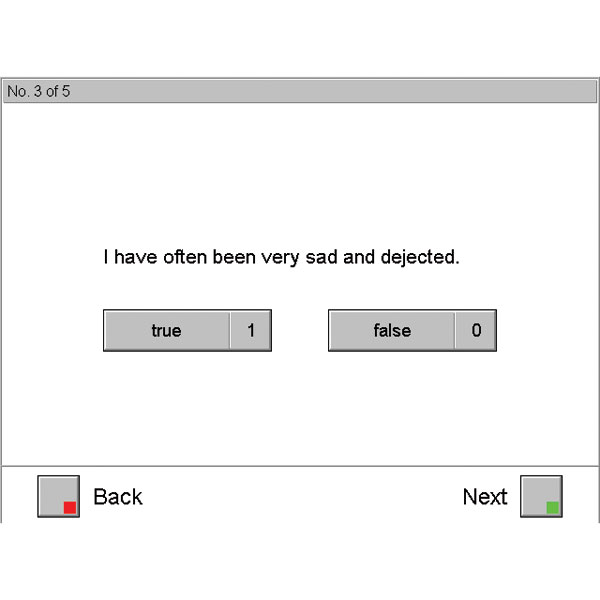
Alcoholic Selection Procedure - ATV - 1 Year License
Model 64065
Assessment of "incorrect" attitudes that may lead to alcohol abuse.
Test Overview
The test ATV is the only questionnaire for sale that assesses the alcohol risk level in a Rasch-homogeneous short form.
Main Areas of Application
- Traffic psychology
- Clinical psychology
Theoretical Background
The present test was derived by Bacher (1965) from the American "Manson Evaluation". It encompasses 39 questions altogether that had mainly been translated from the Manson Questionnaire. This test is an instrument not mainly used to assess manifest alcoholism, but to focus in particular on attitudes that may lead to increased alcohol consumption.
Administration
After the instruction phase, the items are presented on the screen one at a time. The respondents can chose between "True" and "False", and have the possibility to correct an item once as well as to skip items. All omitted items are presented one more time at the end of the test. However, the respondents may choose whether or not to respond.
Test Forms
There is a long form with 39, and a Rasch-homogeneous short form with 29 items.
Scoring
The following variables are assessed: "Alcohol risk" and "Dissimulation". The results contain a table with raw scores and standard scores for the variables, the working time, and an optional item analysis protocol.
Reliability
The internal consistency of the test was calculated as Cronbach's Alpha. The reliabilities of the test for both variables, "Alcohol risk" and "Dissimulation" vary between r=0.73 and r=0.79 (or r=0.72 and r=0.76 for the short form). The consistency of the assessment of the individual variables is sufficient. Thus the ATV can be considered as a sufficiently precise diagnostic instrument. The variables "Alcohol risk" and "Dissimulation" in both, the long and the short form, correlate to a great extent, i.e. both variables assess the same aspects (Alcohol risk: r=0.97; p=0.000; N=100/ Dissimulation: r=0.99; p=0.000; N=98).
Validity
The test was administered to 345 individuals, split into two groups (Biehl, 1972). One group (N=180) consisted of drivers who had been apprehended on one or more occasions for drink-driving and referred by the authorities for traffic psychological assessment. These individuals cannot be regarded as alcoholics in the clinical sense. The other group (N=165) consisted of drivers who had not committed any drink-driving offences.
The variable Alcohol risk distinguishes between the two groups at a significant level. There is no significant difference between the two groups on the Dissimulation scale; that is, the tendency to lie is the same in both groups.
Norms
The variables Alcohol risk and Dissimulation were normed. The norms provided are derived from traffic-psychological examinations. The norm sample (N=427) is made up of 361 (84%) men and 66 (16%) women. The sample is subdivided into two age groups; there are significant differences between these two groups.
Testing Time
Between 5 and 10 minutes (including instruction phase), depending on test form.
VTS System Overview
The Schuhfried VTS enables computer-assisted application of a large number of highly diverse psycho-diagnostic tests and measuring procedures. In developing the system much emphasis was placed on transparent structure and largely uniform design. It is therefore simple to operate and easy to understand and does not require any special computer skills.
The VTS basic module is required for administration of any of the available tests.
The Schuhfried VTS supports the administration of both single tests and test batteries. Many of the single tests are available in different test versions. These test versions may differ, for example, in terms of test duration or difficulty or may be parallel forms. They are characterized by different parameters reflecting specific test requirements. They have been designed for administration to a specific population (e.g. psychiatric patients, children, etc.) or for special measuring purposes (e.g. repeated measurements). Test batteries are compiled from the available single tests and test versions.
